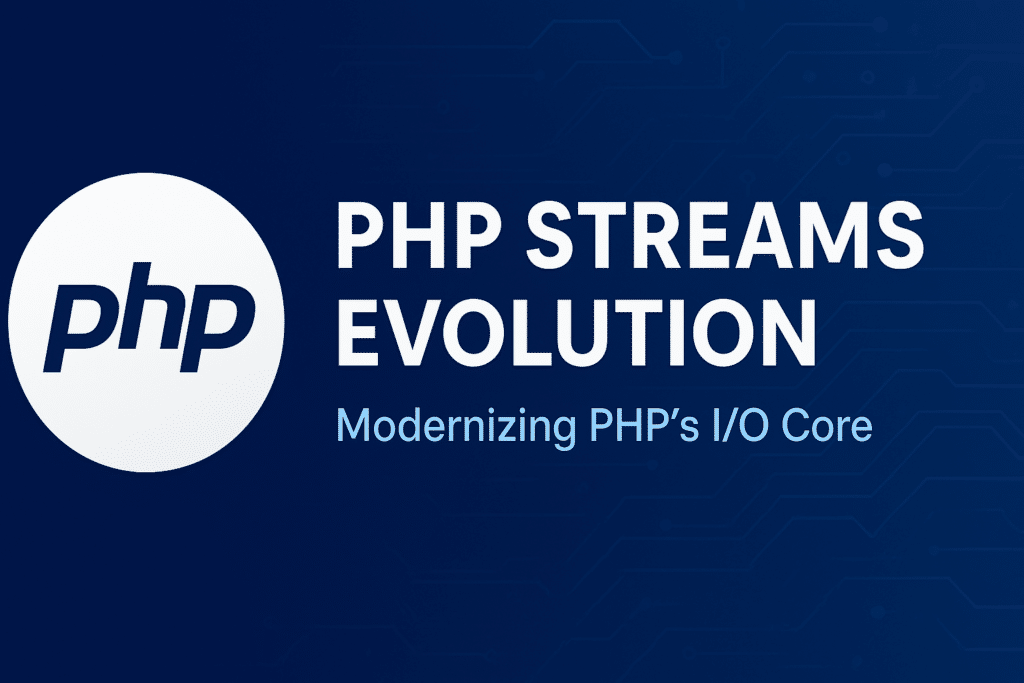
PHP Streams Evolution: Upgrade That Makes Your Code 10X Faster
The PHP Streams Evolution introduces async I/O, io_uring integration, TLS 1.3, and standardised error handling — eliminating blocking I/O and unlocking massive concurrency and performance gains at the core level.
Every PHP application relies on I/O (Input/Output) the operations of reading and writing data. Whether it’s loading a file, fetching JSON from an API, or handling a database query, I/O is the foundation.
This process is managed by PHP Streams, which act as a unified abstraction layer for all data transfer. While incredibly flexible, the underlying implementation is often constrained by a critical flaw: blocking I/O.
When your PHP script asks to read a large file, the script stops all work and waits for the entire operation to finish. This wasted time is the biggest scalability killer in high-concurrency environments.
The good news? The PHP Streams Evolution is here.
This monumental project, driven by the PHP Foundation, is modernizing PHP’s I/O core to eliminate blocking behavior, integrate next-generation performance features, and secure the language for the future. The result will be a foundational performance increase that benefits virtually every PHP application.
Let’s explore the technical details of the PHP Streams Evolution and why it’s such a massive leap forward.
Table of Contents
What are PHP Streams?
A PHP Stream is an abstract resource that provides a consistent interface for reading from or writing to any I/O source. This layer of abstraction is what allows functions like file_get_contents() to work seamlessly with a local file, an HTTP endpoint, or even compressed data.
Code Example: Stream Abstraction in Action
The code remains simple, but the stream layer handles the complexity of the data source:
// Reading from a local stream (file system wrapper)
$local = file_get_contents('local_settings.txt');
// Reading from a network stream (HTTP wrapper)
$remote = file_get_contents('https://api.example.com/live');
// Reading from a filtered stream (compression filter)
$unzipped = file_get_contents('compress.zlib://archive.zip');The PHP Streams Evolution targets the underlying mechanisms powering these interactions.
The Core Technical Upgrades of the PHP Streams Evolution
The modernization efforts are concentrated on three pillars: removing bottlenecks, enhancing concurrency, and enforcing modern security standards.
1. Eliminating Blocking I/O: The Async Performance Leap
The most significant performance gain comes from moving to Non-Blocking and Asynchronous I/O (Async I/O).
- What is the Problem: Traditional I/O involves the CPU waiting idly while the peripheral (disk, network card) completes the transfer.
- Here is solution: System-Level Async Integration. The PHP Streams Evolution will integrate deep with operating system features like Linux’s
io_uring. This allows the PHP process to tell the kernel to handle the I/O task and notify the process when it’s done, freeing PHP to process other concurrent requests in the meantime.
Scaling Network Concurrency: The Polling API Overhaul
For high-concurrency network servers, the old select() system call (used internally by PHP) is a major scaling bottleneck. The evolution introduces modern, high-performance polling mechanisms:
epoll(for Linux environments)kqueue(for BSD/macOS environments)
These highly efficient mechanisms are essential for building scalable event-driven applications, paving the way for faster async frameworks.
2. Mandatory Security: Full TLS 1.3 Integration
The security of encrypted streams is being guaranteed through complete integration of TLS 1.3, the current industry standard.
The stream layer’s OpenSSL extension is being refactored to support all TLS 1.3 features efficiently:
- Zero Round Trip Time (0-RTT): Significantly reduces latency for secure connections by allowing clients to send data immediately upon reconnection.
- Streamlined Asynchronous Handshakes: Improves the stability and performance of secure connections in non-blocking environments.
3. Stability and Diagnostics: Standardized Error Handling
To boost debugging and system monitoring, the project focuses on standardizing how low-level I/O errors are reported. Instead of cryptic warnings, the system will provide context-rich errors and structured exceptions, making it easier for developers to diagnose the exact point of failure within complex I/O pipelines.
Practical Impact: Code That Stays the Same, but Runs Faster
The immense benefit of the PHP Streams Evolution is that the performance boost is achieved at the core level. For most developers, your existing stream code will automatically be faster, more concurrent, and more secure.
Invisible Performance Optimisation
A function that copies data will see a massive, internal efficiency gain without any change to the function call:
// Copying a large data stream between two resources
$source_stream = fopen('big_file.data', 'r');
$target_stream = fopen('backup.data', 'w');
// The implementation of this function is being rewritten to use non-blocking,
// system-level I/O, resulting in a performance multiplier.
stream_copy_to_stream($source_stream, $target_stream);Conclusion: Securing the Future of PHP I/O
This PHP Streams Evolution is not a minor update; it is a foundational reset that guarantees PHP remains competitive, scalable, and robust for the next decade. It’s the highest form of Experience and Expertise being applied to the core engine of the language.
The hidden killer of performance blocking I/O is being eradicated, making way for true concurrency.
